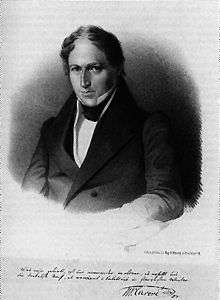Friedrich Wilhelm Carové
Friedrich Wilhelm Carové (June 20, 1789 – March 18, 1852) was a German philosopher and publicist.[1]
Friedrich Wilhelm Carové | |
|---|---|
 Lithograph made after 1852 | |
| Born | June 20, 1789 Koblenz |
| Died | March 18, 1852 Heidelberg |
| Education | University of Heidelberg |
Biography
He was a lawyer, held some judicial offices, was made doctor of philosophy by the University of Heidelberg, and officiated for a short time as professor at Breslau. He was one of the founders of the Heidelberg Burschenschaft, and participated in the famous Wartburg festival. He was afterward a member of the provisional German parliament (German: Frankfurter Vorparlament) of 1848.[1]
Works
His most elaborate works are attacks on the Roman Catholic religion, and include:[1]
- Ueber die alleinseligmachende Kirche (2 vols., Frankfurt, 1826)
- Was heisst römisch-katholische Kirche? (2d ed., Altenburg, 1847)
- Die Buchdruckerkunst in ihrer weltgeschichtlichen Bedeutung (Siegen, 1843)
- Ueber das sogenannte germanische und sogenannte christliche Staatsprincip (1843)
General references
-

gollark: <@235768051683950593> Don't be the NSA. NSA bad.
gollark: Do you want to use current PotatOS or the WIP new version?
gollark: You could use my code, you'd just have to keep the MIT license header in.
gollark: The PotatOS privacy policy may also apply.
gollark: It is MIT licensed. You must comply with the license.
External links
- Works by or about Friedrich Wilhelm Carové at Internet Archive
- Works by Friedrich Wilhelm Carové at LibriVox (public domain audiobooks)

- Friedrich Wilhelm Carové at Library of Congress Authorities, with 10 catalogue records
This article is issued from Wikipedia. The text is licensed under Creative Commons - Attribution - Sharealike. Additional terms may apply for the media files.